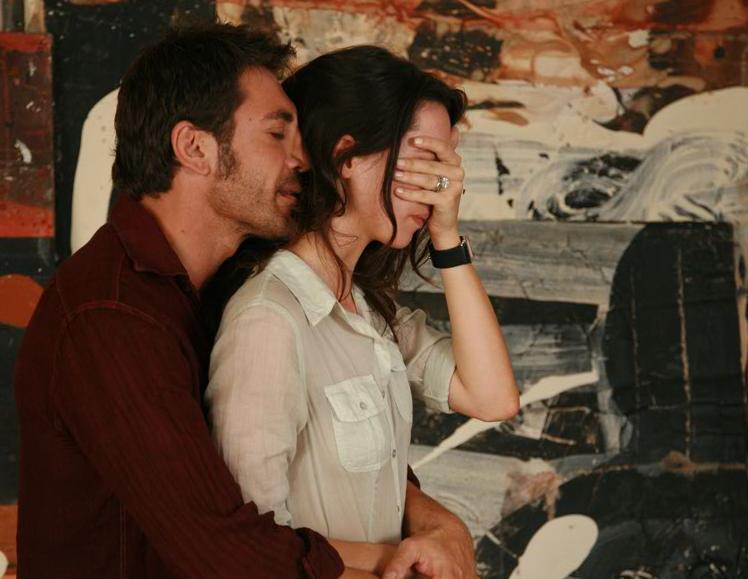Javier Bardem & Rebecca Hall are at the center of Woody Allen’s Vicky Cristina Barcelona.
There are some spoilers in what follows. Proceed with caution.
What makes Vicky Cristina Barcelona the perfect summer bon-bon is something that the film is missing, even more than all the things it has in great quantity – good writing, decent acting, eminently sympathetic characters, a fabulous soundtrack of Spanish guitar, the architecture of Antoni Gaudi for backdrops, almost perfect pacing. What it doesn’t have, for once in Woody Allen’s career, is Woody Allen. It’s not that he’s not a presence, complete with all the signature tics of his film style – a voiceover narrator, a film that loves to talk, people forever puzzled about love, even the latest in his line of screen muses in the presence of Scarlett Johansson – but Allen’s not on screen & nobody is a stand-in for Allen, not even Javier Bardem’s archetypal Latin lover, the painter Juan Antonio Gonzalo, the male at the center of this very female-focused film. As a result, Allen has done something new: made a movie about Other People. And done so very credibly.
The premise of the film is quite simple: two young American women, vaguely post-college, spend two months in
“She’s going to get pregnant,” advises this character’s wife, Patricia Clarkson, the relative who has offered her home to the two girls for July & August, “and that will answer all of her questions.” Except of course, obviously, it won’t. And that really is the story of this film, as it gradually portrays a world in which everyone is well-intentioned, everyone is unsatisfied in love (even Clarkson has a thing on the side with her husband’s business partner), all the women have secrets and the definition of a good life appears to be the willingness to keep asking questions & accept complexity & ambiguity.
None of this is new to cinema – Stealing Beauty, which made a star out of Liv Tyler, does the American-goes-to-Europe-to-find-herself more sensually than VCB (and is a far more accurate portrait of the life of an artist), Desperately Seeking Susan does the straight girl-bohemian girl bond with more zest & it would hard to find more stereotyped Spanish characters than the Bardem’s painter-Lothario & his firebrand ex-wife (from whom Bardem has gotten all of his painting ideas) portrayed with startling gusto by Penelope Cruz. The amazing thing here is that it all works. This is a film all about pacing & balance, with lots of intricate pieces in play at any given moment, in which the characters are forever talking & yet, when Vicky looks over at Juan Antonio as they listen to some Spanish guitar, the whole history of female-male desire is palpable in just her eyes. It’s a great moment & Hall is a terrific actress.
Hall, who received some minor film award nominations for her role in The Prestige, but is largely new to the movies (she comes from a British theater family), is one of the two anchors in this film, the other being Bardem. Bardem’s importance is obvious – he’s involved with all three women – but Hall’s is more subtle & her role more demanding. While Johansson’s Cristina is openly game for everything, up to & including becoming part of an ongoing threesome with the two Spanish painters, Hall has to play somebody more locked into her sense of right & wrong & appropriate. As the film progresses, Johansson’s character grows more certain of herself as a person who is willing to take risks, while Hall’s character discovers that she has depths that will never addressed by a “normal” life. By the film’s end, she’s willing to lie to her husband about how she got shot & you realize that she may very well go on and get pregnant, but that she certainly won’t rely on Doug to provide the depth & meaning to her world.
The only characters in this film about whose internal lives you don’t get some insight are Clarkson’s husband, Mark (character actor Kevin Dunn), & Hall’s husband, Doug, played by Chris Messina (Ted from Six Feet Under). Do they also live lives of quiet desperation or are they the stick figures presented here? The one hint Allen gives that he understands their plight also comes from a third male figure, a young American in a Spanish language class Vicky attends who is just getting started in his career at the embassy & is perfectly willing to hit on the American newly wed. He hasn’t reached the point where he can exteriorize his own insecurities with a boat, a swimming pool or little red sports car, but he’s testing the waters of life just like everyone else.
Of the minor characters, the most interesting is Juan Antonio’s father, a poet who refuses to publish, appears to live alone, & who talks openly about his desire to sleep with Juan Antonio’s ex-wife. Seeing Juan Antonio with his dad is what first softens Vicky’s attitude towards the fellow who, she is sure, just wants to get into her pants. Asked why his dad won’t publish, Juan Antonio replies that the old man “hates people” because “they refuse to love.” No further explanation as to what gave rise to that opinion. As an allegory, that doesn’t quite work. But as a narrative thread that is spun out but not completed – like the language student – it adds a layer of indeterminacy that serves this picture well.
This is one of those films in which the main characters, Vicky & Cristina, learn things about themselves and that is the plot. What they learn is not particularly comforting – Woody Allen doesn’t do comfort – but that they are capable of growth is perhaps the most optimistic message Allen has ever had.






